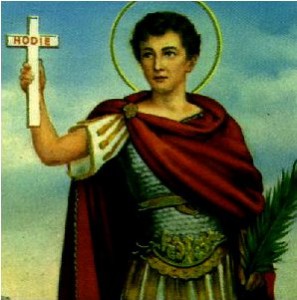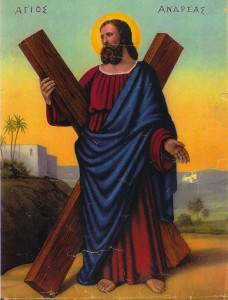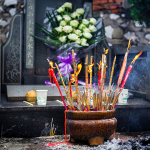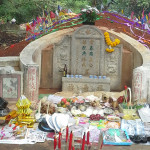Throughout the world, various cultures have ways of honoring departed family members and loved ones. Many of us in the west are family for All Saints’ and All Souls’ Days, which is a time to clean and decorated family graves with candles and flowers and offer prayers for them at home and in church. In Mexico and Central America altars erected for these Days of the Dead and can be quite elaborate and exquisitely beautiful. In the United States many people attend Memorial Day Parades in late May and plant flowers in cemeteries to honor deceased family members and especially veterans. These are all lovely and meaningful observances. In China and among Chinese émigré communities there exists an equally fascinating holiday celebrated in remembrance of the dead that is lesser known to westerners: Qingming.
Qingming (清明節) literally translates as The Festival of Pure Brightness, which is most likely a reference to the time of year when the celebration takes place, mid spring, when the weather becomes warm and the sun shines longer each day. More specifically Qingming falls of the 15th day after the Spring Equinox, so usually the 4th of 5th of April on the Gregorian calendar. On this day Chinese families sweep and clean the graves of their ancestors, a practice which has led the observance to be called Tomb Sweeping Day in the west. Offerings of spirit money and other papier mache items are burnt to ensure a wealthy afterlife for one’s departed loved ones. People also make offerings of food and incense and kowtow (bow deeply and touch their heads to the ground) in front for familial graves and ancestor altars in the home. Offerings are also made for the Hungry Ghosts, those who have nobody to pray for them, but there is a festival dedicated specifically to these needy souls that occurs later in the year, around the August full moon, and Qingming is more a time to honor and remember one’s own ancestors and friends who have left this world.
In order to understand such practices as offering food and money for the dead, it’s important to examine traditional Chinese Taoist beliefs regarding the afterlife. In Chinese folk religion the immediate afterlife resembles very much life on Earth and the more material goods and money one has, the more comfortable the afterlife will be. For this reason people hold elaborate funerals with a variety of papier mache offerings in the shape of mansions, servants and in more recent years sports cars and credit cards. Joss paper which is considered currency for the spirit world is also burned in large quantities at funerals and special festivals throughout the year to ensure one’s ancestors are well provided for. Curiously the denominations of spirit banknotes are astronomically high sometimes several billion dollars on a single note which is the source of a popular joke that states either everybody in the afterlife is extremely rich or inflation is a huge problem. This immediate afterlife is temporary, similar to the western concept of Purgatory, although it is not necessarily a place of penance and expiation, and after a certain period of time people are either reincarnated or pass on to Paradise where material offerings are no longer needed.
Shortly after its rise to power, the Chinese Communist Party outlawed Qingming observances and in fact all religious practices viewing them as superstitious and counterrevolutionary, but many citizens continued to celebrate traditional religious holidays in secret. The ban was only lifted in 2008 and today Qingming is a public holiday with free highway access nationwide and many companies offering bonuses to their employees. In Taiwan, Qingming has been somewhat politicized as it is the anniversary of the death of Chiang Kai-Shek, the nation’s first president and anti-communist leader. In Chinese communities abroad, Qingming serves as a means to remain connected with one’s past and cultural roots. Throughout China this day of mourning and celebration conjures up deep feelings as captured in this Tang Dynasty poem by the famous classical poet Du Mu:
| 清明時節雨紛紛 | 清明时节雨纷纷 | A drizzling rain falls on the Mourning Day; |
| 路上行人欲斷魂 | 路上行人欲断魂 | The mourner’s heart is breaking on his way. |
| 借問酒家何處有 | 借问酒家何处有 | Inquiring, where can a wineshop be found? |
| 牧童遙指杏花村 | 牧童遥指杏花村 | A cowherd points to Apricot Flower Village. |
I hope you’ve enjoyed reading about this beautiful day of remembrance and no matter what our cultural traditions and backgrounds, we can take an example from the beautiful observance of Qingming to pause for a moment any time of year to honor our ancestors and loved ones on the other side and bring to mind all the wonderful experiences we’ve shared with them.
Saint Expedite’s Miraculous Intercessory Powers
He is truly a miracle worker!
 Here is another brilliant testimony to the intercessory powers of Saint Expedite from somebody who recently sought my services. He is truly a miracle worker!
Here is another brilliant testimony to the intercessory powers of Saint Expedite from somebody who recently sought my services. He is truly a miracle worker!
“Thank you to Jamie who helped pray to Saint Expedite for me after I needed extra help. I was in need of money to pay a final balance on a vacation home for my family and I for the Christmas holiday. Not only did I receive the monies to pay the final balance, but we ended up renting a different home that has turned out to be much better and one that we love better! It is because of Jamie’s extra work with Saint Expedite that my prayer was answered! I now have peace of mind. I highly recommend Jamie and his work and I would use him again! ”
Thank you again Jamie!!!
I am truly flattered by the above comments, but thanks is truly due to Saint Expedite!
Saint Expedite’s Miraculous Intercessory Powers
He is truly a miracle worker!
 Here is another brilliant testimony to the intercessory powers of Saint Expedite from somebody who recently sought my services. He is truly a miracle worker!
Here is another brilliant testimony to the intercessory powers of Saint Expedite from somebody who recently sought my services. He is truly a miracle worker!
“Thank you to Jamie who helped pray to Saint Expedite for me after I needed extra help. I was in need of money to pay a final balance on a vacation home for my family and I for the Christmas holiday. Not only did I receive the monies to pay the final balance, but we ended up renting a different home that has turned out to be much better and one that we love better! It is because of Jamie’s extra work with Saint Expedite that my prayer was answered! I now have peace of mind. I highly recommend Jamie and his work and I would use him again! ”
Thank you again Jamie!!!
I am truly flattered by the above comments, but thanks is truly due to Saint Expedite!
Conjuring Good Luck in the New Year!
Back up your New Year's resolutions with some strong spiritual energy!
As the New Year approaches, we tend to pause and reflect of various goals we wish to accomplish which often involve drawing more luck, money and love into our lives. These are commonly called New Year’s resolutions. I would like to share with you a few simple spells, spiritual exercises and even foods you can prepare and eat to help drawn luck into your life. This year why not back up your resolutions with some strong spiritual energy! As a side note, the following exercises may be done any time of the year whenever you feel you are in need of a burst of good luck in your life, not just for the New Year.
Before beginning any luck drawing ritual, I would recommend taking a salt water bath to rid yourself of any negativity as it is very important to be spiritually clean before beginning any type of spiritual work. Salt is a great neutralizer. It takes away negativity, psychic sludge, bad luck and even chases away chaotic or harmful spirits and energies. Many cultures and religions even use salt in exorcism rituals. It’s as simple as adding an entire box of salt to a tub full of water and soaking as you normally would. Stay as long as you’d like in the bathtub and make sure that you submerge yourself completely or at least pour some of the salt water over your head. Before leaving the tub, say a quick prayer, for example: With this salt water bath, I cleanse away all psychic sludge, bad luck and negativity. I am powerful and clean! This is just an example, you may use any words you’d like or if there is a prayer appropriate to your religious or spiritual beliefs, you may use it. If you don’t have a bathtub or prefer showers, you can simply stand in the running shower and scrub yourself with handfuls of salt and as the shower washes the salt away, recite the prayer.
Now that you are spiritually cleansed of all the bad luck and psychic sludge of the past year, you are ready to draw some good luck into your life! One simple luck drawing ritual is to light a green or gold candle and simply ask that luck and money flow into your life. Green and gold are the colors of wealth and success. You may wish to write out a list of your goals and resolutions and burn a green or gold candle on top of them to bring luck and spiritual strength to your goals for the New Year.
My absolute favorite ritual to bring luck is the champagne bath! This is an old tradition popular in Puerto Rican and Dominican folk magic. It has been around at least a hundred years and is most traditionally performed on New Year’s Eve to ensure luck and prosperity in the New Year. You may however take a champagne bath any time of year. Champagne is often associated with luxury and immense wealth. Also, its gold color is a symbol of the metal gold and the prosperity associated therewith. I’ve heard from several Puerto Rican spiritual workers that the bubbles of the champagne are meant to lift you up to a higher status in life. The cost of champagne can be prohibitive, so it’s completely acceptable and efficacious to perform this ritual with gold colored beer or ginger ale. You simply stand under the running shower and pour the champagne over your head while concentrating on your desire for luck and wealth. It is a fun ritual to perform and the bubbles feel amazing as they run down your body!
There are a number of foods you can make and eat for the New Year as well. In Eastern Europe it’s common to make a soup out of as many pork products as possible since the pig is a symbol of prosperity. Likewise in the American South it is customary to eat ham hocks with black eyed peas or a salad made out of black eyed peas known as Hopping John. In China, meat filled dumplings and oranges are meant to bring good luck and are consumed in large quantities during Chinese New Year. I have a friend who is a well-known Voodoo priestess and she recommends having champagne and caviar or whatever foods you associate with wealth and abundance on the first of the year to set the tone of luxury and wealth for the rest of the year.
On a final note, for those familiar with Afro-Caribbean or southern folk magic, you may wish to perform an ancestor feast and seek the blessings and protection of your ancestors and spirit guides throughout the New Year. I perform this ritual annually on New Year’s Eve Day. Start by creating a clear space on a table. If you have a white table cloth, lay it down. Onto the table place a glass of water, and however many white food offerings ad you would like, but at least one. Pop corn, rice, dumplings, bread, pancakes, corn meal mush are all acceptable offerings, but be sure not to include any salt as this weakens spirits. You may also wish to place on the table black coffee and a shot of vodka or another strong white alcohol. Then light a white candle and speak to your ancestors and spirit guides and ask them to confer on you good luck, blessings and protection in the year to come. This is a very powerful means of seeking help and blessings from the ancestors and saints and to ensure a successful and happy New Year!
I hope you have enjoyed this article and that you put some of its suggestions into practice. Thank you for taking the time to visit my site and I wish you a happy and prosperous New Year!
Saint Andrew’s Eve
It is a night of magic and mystery
In the English speaking w orld, we are familiar with Halloween, a night dedicated to fun, mystery and a celebration of the supernatural. Across the globe similar festivals exist. There is the Japanese Obon and the Chinese Festival of Hungry Ghosts, both dedicated to honoring the ancestors and especially those spirits who have nobody to pray for them. In Eastern Europe, there is an equally interesting holy day which for centuries has been a night of divination and magic and according to an ancient legend a time when witches, vampires and werewolves roam the countryside at their most powerful. This is the Feast of Saint Andrew which falls on the 30th of November.
orld, we are familiar with Halloween, a night dedicated to fun, mystery and a celebration of the supernatural. Across the globe similar festivals exist. There is the Japanese Obon and the Chinese Festival of Hungry Ghosts, both dedicated to honoring the ancestors and especially those spirits who have nobody to pray for them. In Eastern Europe, there is an equally interesting holy day which for centuries has been a night of divination and magic and according to an ancient legend a time when witches, vampires and werewolves roam the countryside at their most powerful. This is the Feast of Saint Andrew which falls on the 30th of November.
Much of what we know about this popular first century saint comes from the apocryphal text The Acts of Andrew. Andrew was the brother of St. Peter, the first pope, and was originally a follower of John the Baptist who led him to Jesus. Both Andrew and Peter were fishermen from Bethsaida and Jesus urged them to become fishers of men. Andrew was first to answer the call to follow Jesus, which is why is the Eastern Orthodox churches he is known by the title Prōtoklētos, which is Greek means “the first called.”. After the death and resurrection of Jesus, Andrew travelled out of the Holy Land and evangelized many of the peoples of Eastern Europe where there is still a strong devotion to him today. Andrew was martyred in Patras, Greece by crucifixion on an X shaped cross. After his martyrdom, his popularity spread throughout Europe and then the rest of the world and many churches today hold his relics. The Archbishop of Constantinople, first among the Orthodox Patriarchs, is known as the successor of Saint Andrew. We can certainly see in Andrew an example of answering the call to holiness and service.
Curiously in Eastern Europe, especially Poland, Ukraine and Romania, the feast of Saint Andrew has become associated with supernatural beings and occurrences. There are no direct references to Saint Andrew’s association with the occult in sacred scripture, so it is plausible that his feast day occurs around the time of an ancient pagan observance on which divination and magic were widely practiced, but still there is no concrete proof of this. Nevertheless superstitions and magical practices abound on the night of November 30th. In Poland, this night is associated with divination especially in regards to marriage. One popular tradition states that if you place a walnut or chestnut into a fire and recite the alphabet, the letter on which the nut cracks will be the initial of the first name of your future spouse. Another tradition popular throughout Eastern Europe says that if you go to the apple or cherry orchard on St. Andrew’s Day and cut a twig from a tree and then keep it in a glass of water in a warm place in your home that you will marry the following year if the twig blossoms before New Year’s. In Romania, Saint Andrew’s Eve is associated with vampires and werewolves who are believed to be at their most powerful on this night. To this day, in rural villages, peasants will often rub garlic cloves on their windows and farm animals and decorate their doors with garlands of wind roses to offer protection against the undead and witchcraft. Saint Andrew himself is invoked against supernatural attack as well. Another curious legend, and one that I have experienced personally and on which I will expand further below, is that on this night buried treasure can be found in the countryside wherever one sees a mysterious blue light glowing about the ground. If the light happens to be green, it’s best to avoid the treasure since it is protected by supernatural means. In short, it is truly a night of mystery and magic!
At the other end of Europe, in the Galicia region of Spain there is a famous shrine dedicated to Saint Andrew and keeping with his association with the supernatural, there is much magical folklore surrounding this remote oratory. A popular legend says that those who do not go to San Andrés de Texido alive must do so after death before their souls can go to Heaven. Visitors to San Andrés de Texido carry rocks which they deposit is large piles near the temple as proof that they have made the pilgrimage. In addition to the occult folklore that surrounds this rural church, there is no doubt that many miracles have been brought about through Saint Andrew’s intercession. I have not made the pilgrimage to San Andrés but definitely intend to do so at some point in my life.
On a personal note, I have experienced a supernatural occurrence on Saint Andrew’s Eve. It happened fourteen years ago before I knew much about Saint Andrew and the folklore surrounding his feast day. I was driving on an icy cold night on rural roads in Whately, Massachusetts and in the middle of a frost covered field I saw a blue circular light shoot up from the ground and then fall back down and hover as a dull glow. The first thought that crossed my mind was that it could be some kind of UFO of somebody conjuring energy as part of an occult ritual. As I was in unfamiliar territory, I just drove on. Had I know at the time about the legends surrounding buried treasure being exposed by a blue light of Saint Andrew’s Eve, I most certainly would have stopped to investigate!
I hope you have enjoyed learning about this powerful saint and the supernatural events associated with his feast day. This 30th of November, or any time you’d like, you may wish to offer a prayer for his blessing and protection and make a small offering such as a candle or some flowers. May Saint Andrew bless and protect us and may our lives be filled with peace and happiness!

